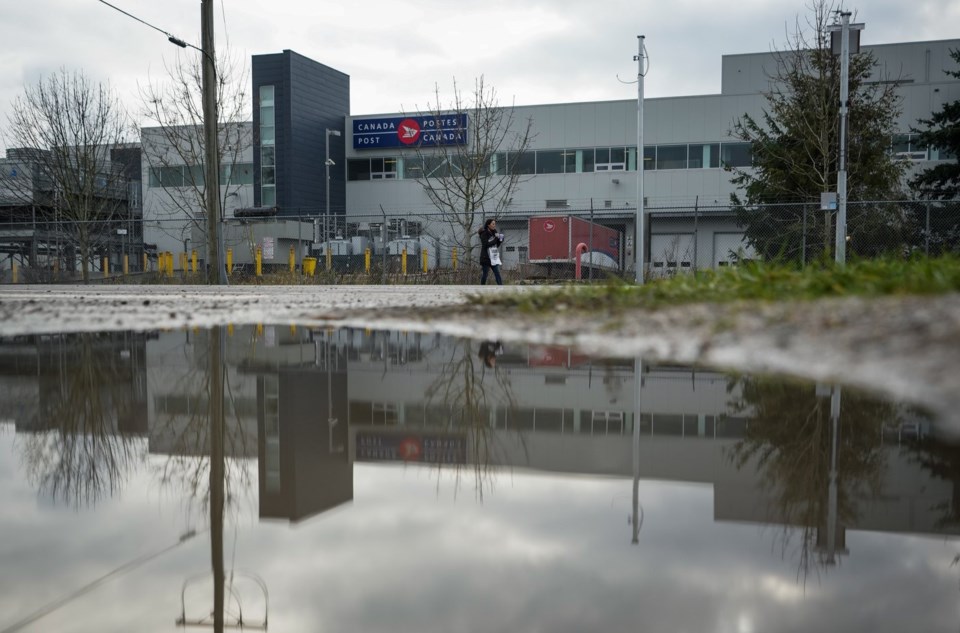HALIFAX — Community leaders in Northern Canada say the postal strike is choking off the supply of some necessities and could mean children in more remote regions don't receive gifts this year during the holiday season.
"It's cancelling Christmas celebrations for a lot of families, and it's also impacting a lot of the goods we rely on getting," Lela Evans, a Progressive Conservative member of the legislature in northern Labrador, said in a telephone interview Monday.
Barry Andersen, the angajukKâk — or mayor — of Makkovik, said communities in northern Labrador depend on Canada Post for most of their packages, including some medications and supplies of children's diapers, as there are no courier services.
He said sending small parcels by airplane from Happy Valley-Goose Bay, N.L., to his northern community often costs more than the price of the Christmas gift inside, while the ferry service to Makkovik will soon end for the season.
‚ÄúI know one person who had a small box coming from 91‘≠¥¥ Tire via aircraft and that little box with some kid‚Äôs hockey equipment would have cost $114 to ship it from Goose Bay to Makkovik,‚Äù he said.
Jermaine Manning, a mother of three children aged 21, 13 and 10, said many residents in Makkovik have already spent money on Christmas gifts that are now stranded in the mail.
"As a single parent, I worked really hard to get my Christmas orders in, and it's simply not going to happen .… There's going to be a lot of disappointment," she said in an interview Monday.
"It's hard to sympathize with the strikers at a time like this .... Where you have remote communities like Makkovik that don't have options, it's a pretty rotten thing to do."
Andersen said it's concerning that Ottawa doesn't have a backup plan for northern communities, where residents cannot easily drive to a larger centre to purchase supplies or gifts. "Some of the (postal) strikers should be called back and ensure the packages are put back on route," he said.
Evans said while shortages of basic supplies are a key concern, there will also be sadness in communities where only a few children will receive gifts flown in. "Some will have Santa Claus, some will not," she said. "Children will ask, 'Why did Santa come for my neighbour next door, but not me?'"
Natan Obed, the president of an organization representing 70,000 Inuit, said every day the strike continues adds to the hardship in remote communities, as pension cheques haven't reached elders, and in some cases people have had to fly south to purchase medicines.
He said his group — Inuit Tapiriit Kanatami — has sent letters to federal Labour Minister Steven MacKinnon and Public Services Minister Jean-Yves Duclos asking them to intervene. "This is an essential service and its disruption has deep consequences across all our communities, and we're asking the federal government to do all it possibly can in the quickest manner possible," Obed said in an interview Monday.
He said the strike is also "testing the sustainability of all northern businesses that rely on Canada Post shipping."
Prime Minister Justin Trudeau said in Halifax on Monday that Canada Post is essential to small businesses in remote areas, but he's emphasizing a negotiated resolution.
"I continue to believe the best solution will come at the bargaining table, but everyone at Canada Post ‚Ķ needs to know this is hurting 91‘≠¥¥s, small businesses and people right across the country and is endangering the long-term viability of Canada Post as a service 91‘≠¥¥s rely on," Trudeau said.
"If you break trust in an institution, it's really hard to rebuild it," he added. He said his government is putting all the pressure it can on Canada Post to resolve the strike as quickly as possible.
Obed said, "standing by and hoping there is an agreement isn't something that our communities can take solace in. This shouldn't have happened at all."
This report by The 91‘≠¥¥ Press was first published Dec. 9, 2024.
— With files from Keith Doucette
Michael Tutton, The 91‘≠¥¥ Press



